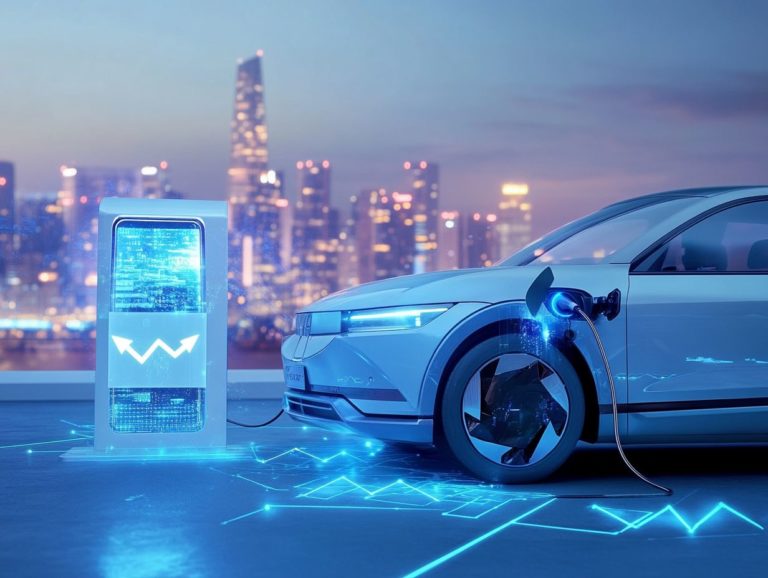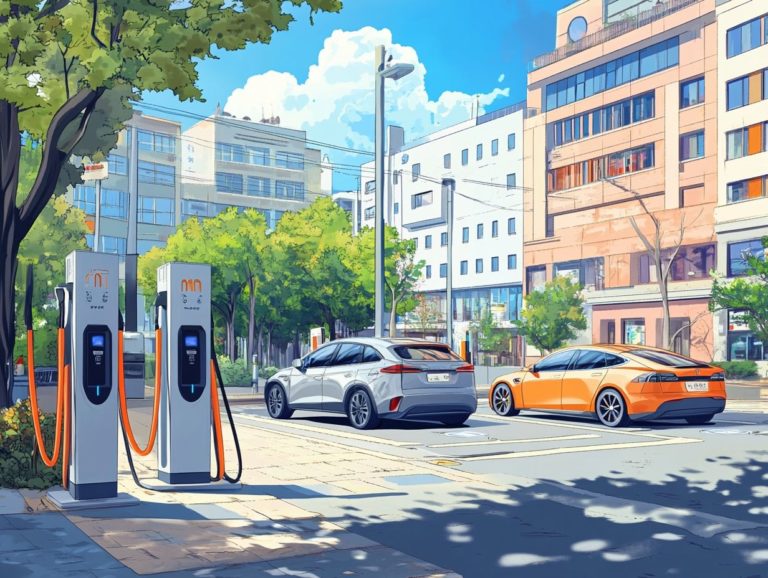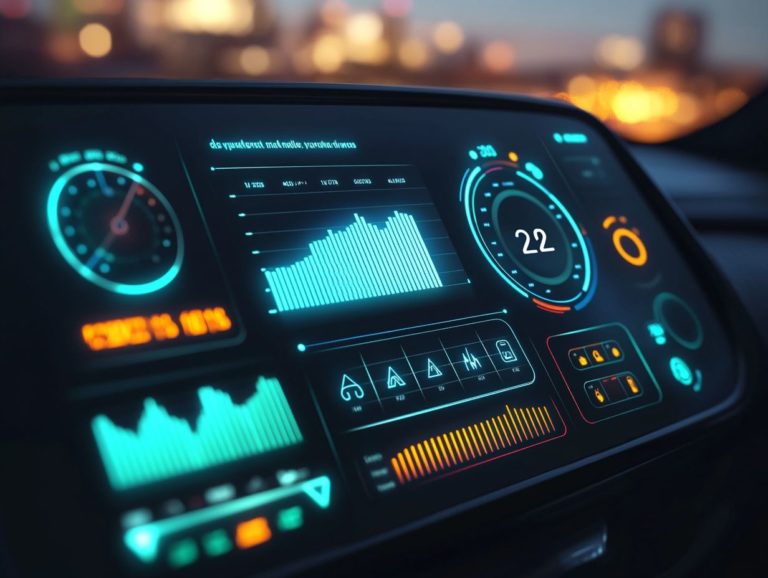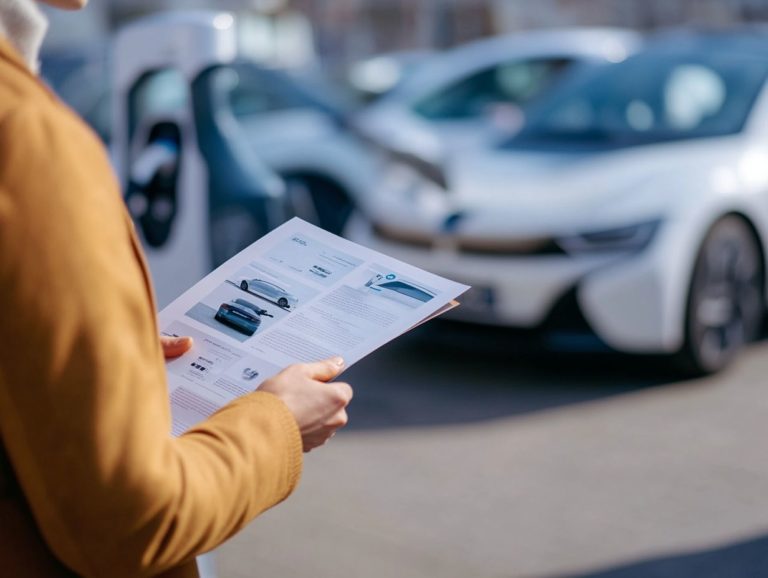How Can I Improve My EV’s Battery Life?
As electric vehicles (EVs) gain popularity, understanding their batteries is essential for maximizing performance and longevity.
This article explores the various types of batteries used in EVs and examines factors affecting their lifespan, such as driving habits and environmental conditions.
You ll find practical tips for extending battery life, covering proper charging techniques, maintenance, and driving habits that promote efficiency.
It also addresses common battery issues and offers effective solutions. Immerse yourself in this knowledge to ensure your EV operates smoothly for years to come!
Contents
- Key Takeaways:
- Understanding Electric Vehicle Batteries
- Factors Affecting Battery Life
- Ways to Extend EV Battery Life
- Common Battery Issues and Solutions
- Frequently Asked Questions
- How Can I Improve My EV’s Battery Life?
- Will driving in extreme weather conditions affect my EV’s battery life?
- Is it bad to frequently charge my EV’s battery?
- How often should I get my EV’s battery checked?
- Are there any special precautions I should take when storing my EV for a long period?
- Can I replace my EV’s battery if it starts to lose its charge?
Key Takeaways:
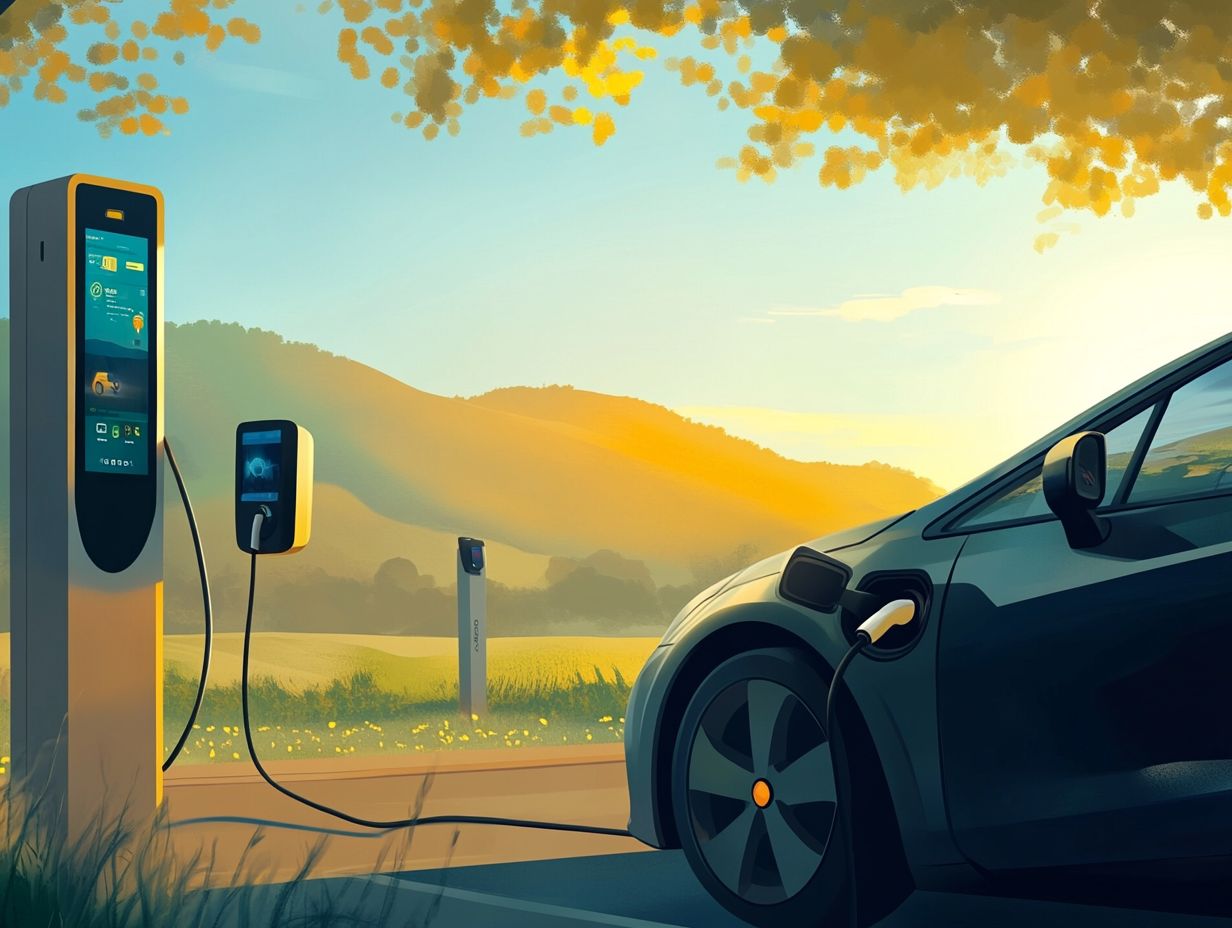
- Regular maintenance and proper charging habits can significantly extend the life of your EV battery.
- Environmental factors and driving habits can impact battery life, so be mindful of your driving and charging practices.
- If facing battery issues, consider solutions such as battery replacement or upgrading to a newer, more efficient battery type.
Understanding Electric Vehicle Batteries
Understanding electric vehicle batteries is crucial if you want to maximize your car’s performance and longevity. Lithium-ion batteries, which power many devices including smartphones and laptops, have become the gold standard for electric vehicles.
These batteries are designed to supply the necessary power to electric motors. Their advanced management systems work diligently to maintain optimal battery health and performance throughout your vehicle’s life.
Types of Batteries Used in EVs
Today, several types of batteries power electric vehicles, with lithium-ion batteries reigning supreme due to their impressive energy density and efficiency.
These batteries are lightweight and boast remarkable longevity, making them essential when evaluating brands like CATL, LG Energy Solution, BYD, and Panasonic. Each manufacturer brings unique advancements in battery technology, enhancing performance and extending battery life.
For instance, CATL excels in producing high-capacity lithium batteries that maximize range for compact EVs. Panasonic s partnerships with major automakers highlight its commitment to sustainable energy solutions, reinforcing its role in the shift toward electric mobility.
Similarly, BYD s innovations and LG s focus on safety and sustainability reflect a collective effort to meet the evolving demands of the automotive sector and contribute to a greener future.
Factors Affecting Battery Life
Several factors can profoundly impact the battery life of your electric vehicle, including driving habits, charging cycles, and environmental conditions.
Understanding how these elements contribute to battery degradation is vital for maintaining battery health and extending its lifespan. Learning how to extend your EV’s battery life can empower you, as your driving techniques, temperature management, and commitment to regular maintenance can significantly influence the condition and performance of your EV battery.
Impact of Driving Habits and Conditions
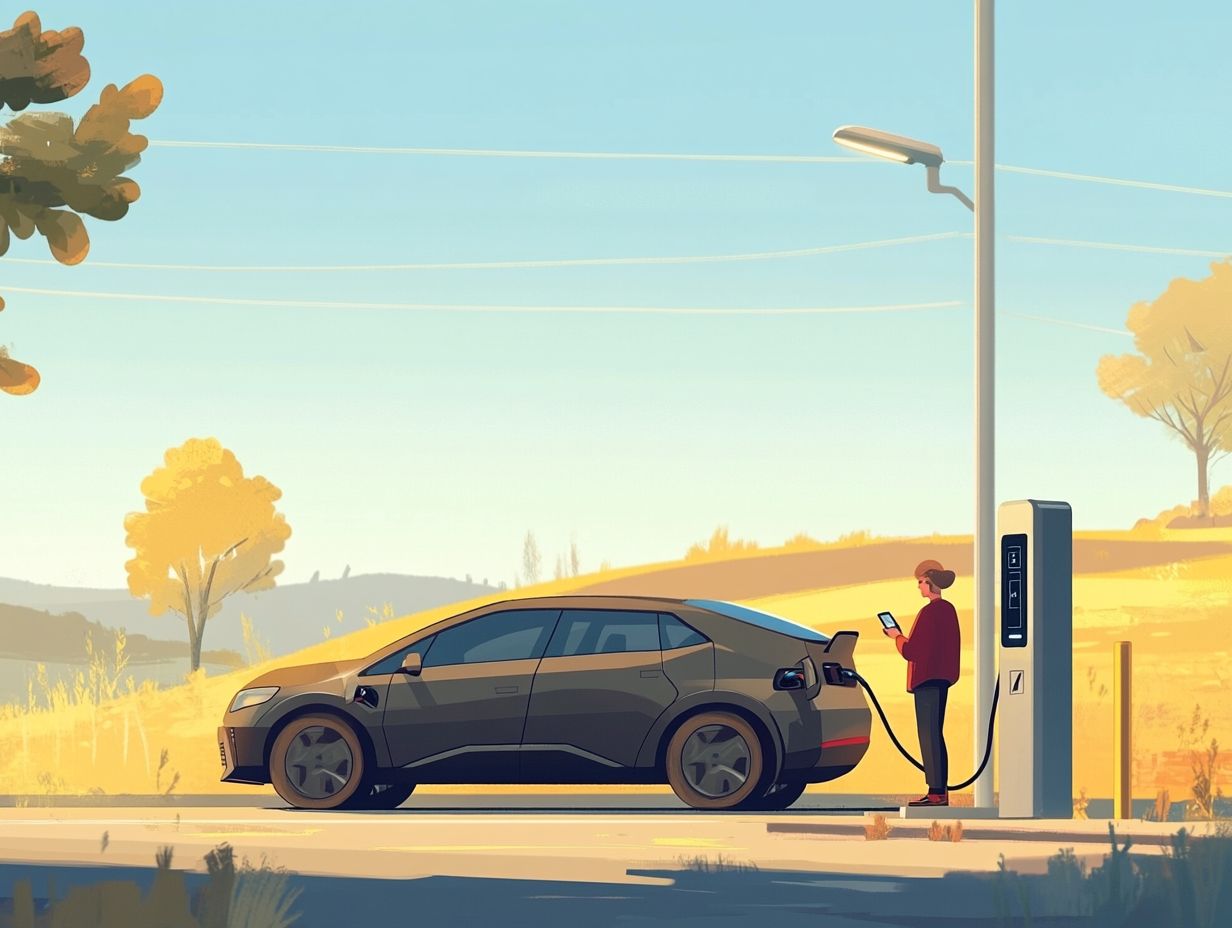
Driving habits and conditions are crucial factors that influence the efficiency and longevity of your electric vehicle’s battery.
Aggressive maneuvers like rapid acceleration and high-speed driving put unnecessary strain on the battery. This behavior can lead to faster battery depletion, so smooth driving is the way to go!
By adopting smoother acceleration techniques and maintaining a steady speed, you can enhance your battery’s efficiency. Simple strategies, such as anticipating stops and gently coasting, not only improve your driving experience but also contribute to ensuring your EV’s longevity. This mindful approach translates to reduced maintenance costs and improved performance over time.
Start implementing these tips today to keep your EV battery healthy and efficient!
Environmental Factors
Environmental factors, particularly temperature, can dramatically affect your battery’s health and lifespan especially with the lithium-ion batteries found in electric vehicles.
Extreme temperatures present significant challenges. Excessive heat can accelerate chemical reactions that lead to degradation, while freezing conditions slow down the chemical processes needed for energy transfer, hindering performance. This duality highlights the importance of effective temperature control mechanisms within battery management systems. By maintaining an optimal thermal environment, you can enhance both performance and longevity.
Using different charging methods like smart charging that changes based on temperature can reduce the negative effects of temperature fluctuations. This helps your battery work efficiently, regardless of the weather.
Ways to Extend EV Battery Life
Are you ready to maximize your battery’s lifespan? You have access to several effective strategies that can help prolong the battery life of your electric vehicle, all centered around proper maintenance and smart charging practices.
By adopting battery management techniques, you can enhance your vehicle’s battery performance and overall efficiency. Learning how to optimize your EV’s range, understanding charging cycles, and avoiding charging to 100% all play a crucial role in maintaining your battery’s optimal condition over time.
Proper Charging and Maintenance
Proper charging and maintenance are key to ensuring the longevity and efficiency of your electric vehicle batteries.
Following best practices like using AC chargers and planning your stops at charging stations can significantly enhance your battery life. Establishing a regular charging routine helps prevent issues related to deep discharging and keeps your vehicle performing at its best. Transitioning to home chargers overnight offers a seamless way to ensure your vehicle is always ready for the next journey.
Be mindful of how temperature fluctuations impact battery performance. Whenever possible, park in shaded or climate-controlled environments to safeguard your battery health.
Efficient Driving Techniques
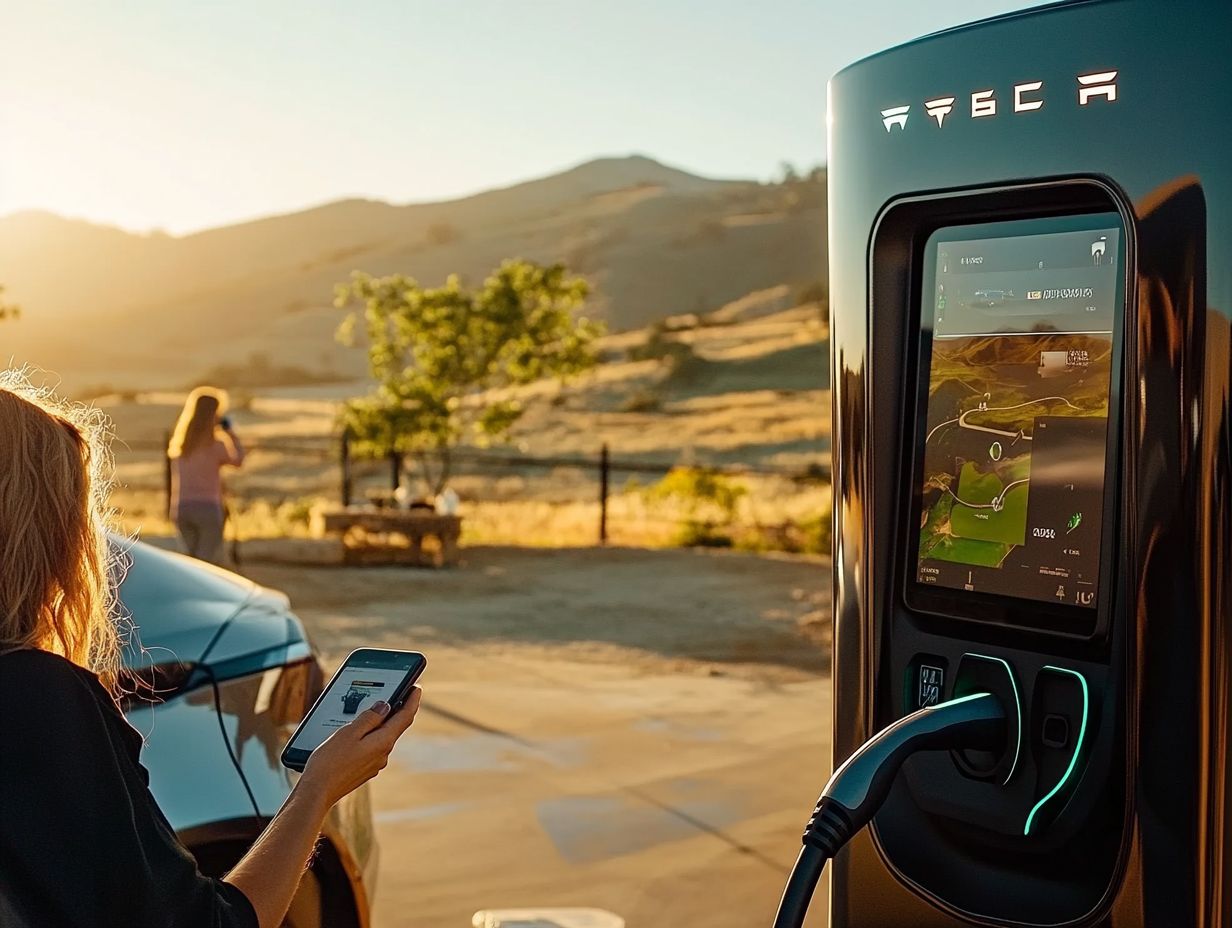
Employing efficient driving techniques is essential for maximizing your EV range and optimizing battery usage.
Incorporating smooth acceleration and gentle braking into your daily driving habits allows you to cover more distance on a single charge. Gradually easing off the accelerator instead of making sudden stops or starts helps conserve energy, while taking advantage of regenerative braking lets you recover power that would otherwise be lost.
Maintaining steady speeds and minimizing excessive idling will improve your battery efficiency. Additionally, planning your routes to avoid heavy traffic and hilly terrains, along with utilizing eco-driving modes, can lead to longer trips and reduced energy consumption. For more insights, check out understanding EV battery lifespan and care, making your journeys more enjoyable.
Common Battery Issues and Solutions
Be aware of common battery issues to keep your vehicle running smoothly! In the realm of electric vehicles, you may encounter challenges like degradation or the need for replacement. These factors can significantly influence the overall condition and safety of your vehicle’s battery.
Stay alert about these challenges to keep your battery performing well.
Dealing with Battery Degradation
Dealing with battery degradation is crucial for you as an EV driver looking to maintain optimal battery health and performance.
Understanding the factors that contribute to degradation is essential. Be aware that temperature extremes, frequent fast charging, and your overall charging habits all play a significant role. By employing effective battery management techniques such as regulating charging speeds and keeping temperature levels moderate you can enhance the longevity of your battery.
Incorporating routine maintenance practices, like checking for software updates and ensuring your battery is calibrated correctly, can be pivotal in preserving its health. Regularly monitoring battery performance allows you to identify potential issues early on, enabling timely interventions that can prevent significant capacity loss in the future.
Replacing or Upgrading Batteries
The choice to replace or upgrade your EV battery involves several key considerations, including battery technology, costs, and your vehicle s warranty period.
Since electric vehicles primarily rely on their batteries, recognizing when a replacement is necessary is essential. Indicators like reduced range, extended charging times, or noticeable dips in performance are clear signs that it may be time for a change.
When upgrading, you have various options at your disposal, including newer battery technologies that offer improved efficiency or even higher capacity for an extended range. These choices not only affect your immediate costs but also significantly influence the long-term performance of your vehicle.
A thoughtfully selected upgrade can boost reliability and longevity, ultimately enhancing your driving experience and saving you money on future battery-related expenses.
Frequently Asked Questions
Got questions about caring for your EV’s battery? Here are some common concerns.
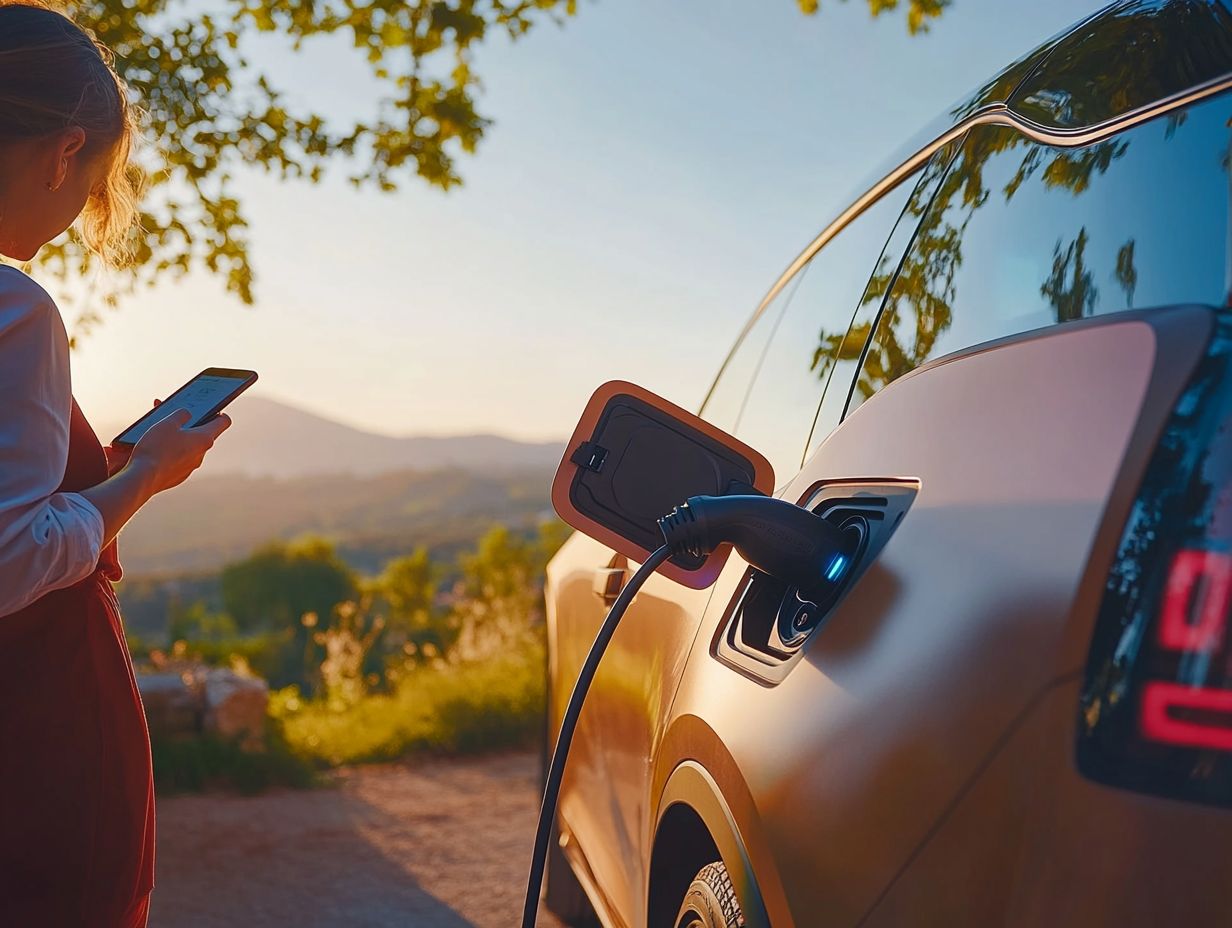
How Can I Improve My EV’s Battery Life?
To improve your EV’s battery life, follow these simple tips:
- Avoid frequent fast charging: Fast charging can strain your EV’s battery and wear it out. Limit fast charging to only when necessary.
- Keep your battery charged between 20-80%: Maintaining a charge between 20-80% helps extend the battery’s life. Avoid fully charging or completely draining it.
- Park in a shaded area: Extreme temperatures can negatively impact your battery’s health. Parking in a shaded area helps keep the battery cool and prevents damage.
- Use regenerative braking: Many EVs have a feature that helps recharge the battery while driving. This reduces strain on the battery and can improve its lifespan.
- Keep up with regular maintenance: Just like any other vehicle, EVs require regular maintenance to ensure all components, including the battery, are functioning properly.
- Consider investing in a home charger: Charging your EV at home can be more convenient and helps maintain the battery’s health by avoiding frequent use of public charging stations.
Will driving in extreme weather conditions affect my EV’s battery life?
Yes, extreme temperatures can negatively impact your EV’s battery life. Extreme heat can cause the battery to wear out faster, while extreme cold can reduce its range. Try to park your EV in a shaded area and avoid prolonged exposure to extreme temperatures.
Is it bad to frequently charge my EV’s battery?
Frequent charging, especially fast charging, can strain your EV’s battery and reduce its lifespan. Only fast charge when you really need to, and keep the battery between a 20-80% charge for optimal health.
How often should I get my EV’s battery checked?
Get your EV’s battery checked during regular maintenance appointments. This helps identify any potential issues and ensures the battery is functioning properly.
Are there any special precautions I should take when storing my EV for a long period?
If you plan on storing your EV for an extended period, keep the battery charged between 50-75%. This helps prevent the battery from fully draining and potentially suffering damage.
Can I replace my EV’s battery if it starts to lose its charge?
Yes, you can replace your EV’s battery if it starts to lose its charge. However, battery replacement can be expensive. It’s best to maintain the battery’s health to extend its lifespan and avoid the need for replacement.
Ready to boost your EV’s performance? Start following these tips today!


